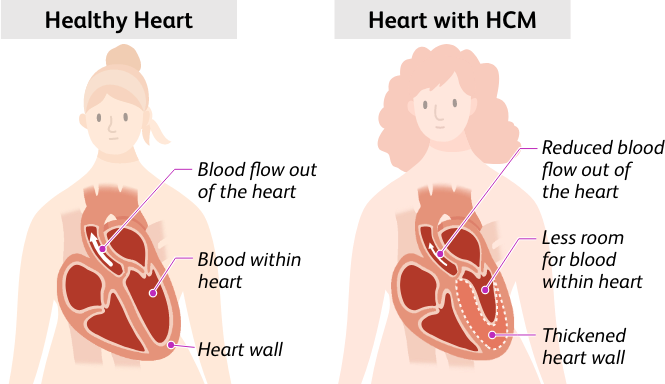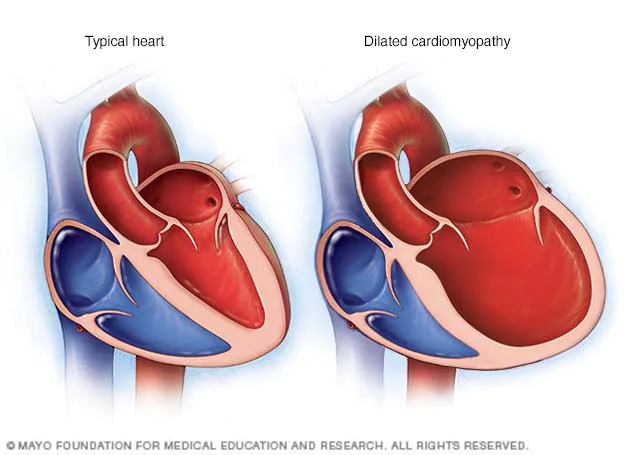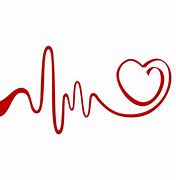Cardiomyopathy and Atrial Fibrillation
Cardiomyopathy is a common cause of Atrial Fibrillation
Cardiomyopathy (Kahr-dee-o-my-op-uh-thee) is an acquired or inherited disease of the heart muscle which makes it difficult for the heart to pump blood to other parts of the body. Urgent medical attention is usually recommended by healthcare authorities. Cardiomyopathy can be dangerous or life threatening if untreated.
Cardiomyopathy can lead to heart failure. The main types of cardiomyopathy include dilated, hypertrophic and restrictive cardiomyopathy. Treatment may include medications, surgically implanted devices, heart surgery or in severe cases, a heart transplant depending on the type and how serious it is.
Types of Cardiomyopathy
Dilated Cardiomyopathy–
Dilated cardiomyopathy is a type of heart muscle disease that causes the heart chambers (ventricles) to thin and stretch, growing larger. It typically starts in the heart’s main pumping chamber (left ventricle). Dilated cardiomyopathy makes it harder for the heart to pump blood to the rest of the body.
Symptoms of dilated cardiomyopathy — such as fatigue and shortness of breath — can mimic other health conditions. A person with dilated cardiomyopathy might not notice any symptoms at first. But dilated cardiomyopathy can become life-threatening. It’s a common cause of heart failure.
Dilated cardiomyopathy is more common in men than women. Treatment of dilated cardiomyopathy may include medications or surgery to implant a medical device that controls the heartbeat or helps the heart pump blood. Sometimes, a heart transplant is needed.
Symptoms- of Dilated cardiomyopathy
( for more information- Mayo Clinic)
Some people with dilated cardiomyopathy don’t have symptoms in the early stages
Signs and Symptoms May Include
- Fatigue
- Shortness of Breath (dyspnes) during activity or while lying down
- Reduced ability to exercise
- Swelling (edema) in the legs, ankles feet or belly (abdomen)
- Chest pain or discomfort
- Fast fluttering or pounding heartbeat (palpitations)
- Excessive Tiredness
- Fainting
- Dizziness and Lightheadedness
Risk Factors
Risk factors for dilated cardiomyopathy include:
- Damage to the heart muscle from certain diseases, such as hemochromatosis
- Family history of dilated cardiomyopathy, heart failure or sudden cardiac arrest
- Heart valve disease
- Inflammation of the heart muscle from immune system disorders, such as lupus
- Long-term excessive alcohol or illegal drug use
- Long-term high blood pressure
- Neuromuscular disorders, such as muscular dystrophy
Hypertrophic Cardiomyopathy (HCM)
Hypertrophic cardiomyopathy (HCM) is a disease in which the heart muscle becomes thickened (hypertrophied). The thickened heart muscle can make it harder for the heart to pump blood.
Hypertrophic cardiomyopathy often goes undiagnosed because many people with the disease have few, if any, symptoms. However, in a small number of people with HCM, the thickened heart muscle can cause shortness of breath, chest pain or changes in the heart’s electrical system, resulting in life-threatening irregular heart rhythms (arrhythmias) or sudden death.
Symptoms of Hypertrophic Cardiomyopathy
Signs and symptoms of hypertrophic cardiomyopathy might include one or more of the following:
- Chest pain, especially during exercise
- Fainting, especially during or just after exercise or exertion
- Heart murmur, which a health care provider might detect while listening to the heart
- Sensation of fast, fluttering or pounding heartbeats (palpitations)
- Shortness of breath, especially during exercise
A number of conditions can cause shortness of breath and fast, pounding heartbeats. It’s important to get a prompt, accurate diagnosis and appropriate care. See your health care provider if you have a family history ofHCM or any symptoms associated with Dilated or hypertrophic cardiomyopathy
Call 911 if you are experiencing Rapid or irregular heartbeat, difficulty breathing or chest pain
Risk Factors for Hypertrophic Cardiomyopathy
Hypertrophic cardiomyopathy is usually passed down through families (inherited). People with one parent with hypertrophic cardiomyopathy have a 50% chance of having the genetic mutation for the disease.
Parents, children or siblings of a person with hypertrophic cardiomyopathy should ask their health care providers about screening for the disease.
How is Cardiomyopathy and Atrial Fibrillation related?
An Average of 1 to 2 in every 10 patients with a cardiomyopathy had Atrial Fibrillation.
“Patients with cardiomyopathy are at risk of developing atrial fibrillation (AF) which is a strong risk factor for thromboembolic events, progression to heart failure, and mortality or heart transplantation. This systematic review and meta-analysis sought to estimate the prevalence of AF in a global population with cardiomyopathy”. Per Pubmed
Atrial fibrillation (AF) is the most common arrhythmia in clinical practice, with an estimated prevalence of 33 million worldwide. More Importantly, cardiomyopathy can be induced or exacerbated by AF, which carries unique epidemiological, pathophysiological, and clinical features.
Atrial Fibrillation-mediated cardiomyopathy (AMC)
This describes A-Fib either as the sole cause for ventricular dysfunction or exacerbating ventricular dysfunction in patients with existing cardiomyopathy or heart failure (HF). Similar to cardiomyopathy caused by other arrhythmias, AMC can be at least partially reversed with restoration of sinus rhythm, thus creating a pivotal opportunity for clinical intervention.
Although previous reviews have addressed tachycardia-induced cardiomyopathy or arrhythmia-induced cardiomyopathy in general, few have focused on AMC. We therefore conducted this state-of-the-art review to discuss the epidemiology, mechanisms, diagnosis, management strategies, and prognosis of AMC.
Atrial Fibrillation and Heart Failure Epidemic
By 2010, of the estimated 33.5 million patients with Atrial Fibrillation globally, between 2.7 million and 6.1 million people were in the United States, and is projected to rise to at least 12.1 million by 2030.
How to Control A-Fib Naturally When You Have Symptoms
Close your nose and mouth and blow out to create pressure in your chest, This Valsalva technique can be very effective. Coughing Hard can reset the rhythm. Tensing your stomach muscles, and bearing down can also force your rhythm back to normal.
What Medications Can Cause Atrial Fibrillation?
Potassium channel blockers, which slow the electrical signals that cause A-Fib. Amiodarone (Cordarone, Nexterone, Pacerone), Dofetilide (Tikosyn), Sotalol (Betapace, Sorine, Sotylize).
How to Treat Atrial Fibrillation Naturally
Natural Treatment for A-Fib, Olive Leaf. The leaves of the olive tree are used to cure tension and help maintain proper circulation of blood. Olive Leaf is rich in elements like flavonoids, triterpenoids, secoiridoids and sterols. They work together to lower blood pressure and thus prevent spasms in the heart muscles, one of the main signs of Atrial Fibrillation.
What to watch for-Signs & Symptoms of HCM
HCM can sometimes be described as a “hidden disease” because people who have it may not always have symptoms. And when HCM symptoms do appear, they may be difficult for doctors to recognize because they are similar to other health conditions such as asthma, anxiety, hypertension, or coronary artery disease.
Even though HCM can be difficult to pin down, there are common symptoms.
When HCM symptoms first appear, you may think that you’re just “getting older” or that you’re “out of shape.” While the best thing to do is talk to your doctor, it’s helpful to learn what symptoms to watch for, how HCM could affect you, and what you can do.
Seek medical attention and talk to your doctor if you experienc any of these symptoms:
- Shortness of Breath
- Rapid Heartbeat
- Chest Pain
- Dizziness
- Unexplained Tiredness
- Fainting

The heart is a muscle that pumps oxygen-rich blood around the body by contracting and relaxing.
In someone with HCM, the walls of the heart become thicker than they should be. This excessive
thickening can cause the heart to become more stiff and leaves less room for blood to fill the heart.
Dilated cardiomyopathy is a type of heart muscle disease that causes the heart chambers (ventricles) to thin and stretch, growing larger. To the right is Dilated Cardiomyopathy and to the left is a typical heart.

I hope you got something to take away from this article, feel free to leave a comment or if you have any questions, please use the Contact Us at the top, leave your email and I will return your message.
This website has a lot more information about A-Fib, feel free to stick around. If you’d like to check my other site out, go to shers-shop-site
Best Wishes, Sherry
